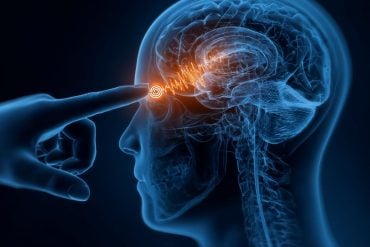Summary: Infection, inflammation, and metabolic disorders early in life could increase the chances of developing depression and psychosis during adulthood.
Source: Wolters Kluwer Health
A growing body of research suggests that early-life infection, inflammation, and metabolic changes could contribute to psychiatric disorders—perhaps via effects during critical periods of brain development.
New evidence on how “immunometabolic” risk factors in childhood may affect the development of depression and psychotic disorders in adulthood is presented in the January/February special issue of Harvard Review of Psychiatry.
If confirmed, this line of research might lead to new approaches to treating depression and psychosis in adults—and possibly efforts to prevent these disorders by targeting early-life immunometabolic risk factors in childhood, according to the report by Nils Kappelmann, Ph.D., of Max-Planck-Institute of Psychiatry, Munich, and colleagues.
The study is one of seven special issue papers exploring possible links between inflammation and mental health disorders.
Complex connections between early-life stress, inflammation, and brain development
Previous research has suggested that maternal and childhood infections may be related to the later development of psychiatric diagnoses—particularly psychotic disorders such as schizophrenia. Other studies have linked markers of inflammation during childhood and adolescence to increased rates of depression and psychosis in adulthood. However, these associations appear highly complex, with specific inflammatory markers linked to later development of specific types of symptoms.
Research has also suggested links between metabolic alterations and psychiatric disorders. In particular, increased body mass index (BMI) and body fat seem to be associated with an increased risk of depression, while lower BMI may be linked to increased risk of psychotic disorders. Other studies suggest that young people with disrupted glucose-insulin balance may be at increased risk of later psychosis, whereas depression may lead to later glucose-insulin dysregulation.
Inflammatory and metabolic changes might interact with other factors affecting the development of psychiatric disorders—particularly genetic predispositions and adverse experiences or maltreatment during early life. “Together, these findings suggest that higher levels of infection, inflammation, and metabolic alterations commonly seen in people with depression and psychosis could be a cause for, rather than simply a consequence of, these disorders,” Dr. Kappelmann and coauthors write.
They call for innovative research approaches to evaluate the causal nature and mechanisms of these associations. “Interventional studies are also needed to test the potential usefulness of targeting early-life immuno-metabolic alterations for preventing adult depression and psychosis,” the researchers add. Some groups of patients might benefit from treatment with anti-inflammatory drugs—although so far, clinical trials of this approach have yielded mixed results.

“This special issue of the Harvard Review of Psychiatry tackles this intriguing topic of psychoimmunology from various perspectives reflecting the interdisciplinary nature of the problem at hand,” according to an introduction by guest editor Paulo Lizano, MD, Ph.D., of Harvard Medical School and Beth Israel Deaconess Medical Center. The topics “summarize the complexity of the inflammatory-brain connection while establishing that inflammation can be causal in a subset of psychiatric disorders and does not follow categorization outlined in the Diagnostic and Statistical Manual of Mental Disorders.”
Dr. Lizano adds, “Despite these many advances, much still remains unknown, and further research is needed to enhance the clinical applicability of these findings.” Key topics for future research include identifying different “inflammatory subtypes” of psychiatric disorders to help in developing specific treatment strategies, and potentially using early recognition and treatment to prevent low-grade brain inflammation during development.
About this inflammation and mental health research news
Author: Press Office
Source: Wolters Kluwer Health
Contact: Press Office – Wolters Kluwer Health
Image: The image is in the public domain
Original Research: Open access.
“Prenatal and Childhood Immuno-Metabolic Risk Factors for Adult Depression and Psychosis” by Nils Kappelmann et al. Harvard Review of Psychiatry
Abstract
Prenatal and Childhood Immuno-Metabolic Risk Factors for Adult Depression and Psychosis
Depression and psychosis have a developmental component to their origin. Epidemiologic evidence, which we synthesize in this nonsystematic review, suggests that early-life infection, inflammation, and metabolic alterations could play a role in the etiology of these psychiatric disorders. The risk of depression and psychosis is associated with prenatal maternal and childhood infections, which could be mediated by impaired neurodevelopment.
Evidence suggests linear dose-response associations between elevated concentrations of circulating inflammatory markers in childhood, particularly the inflammatory cytokine interleukin 6, and the risk for depression and psychosis subsequently in early adulthood. Childhood inflammatory markers are also associated with persistence of depressive symptoms subsequently in adolescence and early adulthood. Developmental trajectories reflecting persistently high insulin levels during childhood and adolescence are associated with a higher risk of psychosis in adulthood, whereas increased adiposity during and after puberty is associated with the risk of depression.
Together, these findings suggest that higher levels of infection, inflammation, and metabolic alterations commonly seen in people with depression and psychosis could be a cause for, rather than simply a consequence of, these disorders. Therefore, early-life immuno-metabolic alterations, as well as factors influencing these alterations such as adversity or maltreatment, could represent targets for prevention of these psychiatric disorders. Inflammation could also be an important treatment target for depression and psychosis.
The field requires further research to examine sensitive periods when exposure to such immuno-metabolic alterations is most harmful. Interventional studies are also needed to test the potential usefulness of targeting early-life immuno-metabolic alterations for preventing adult depression and psychosis.







